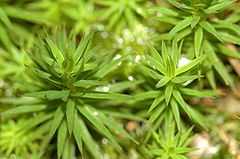Polytrichaceae
From Wikipedia, the free encyclopedia
| Polytrichaceae | |
|---|---|
 | |
| Polytrichastrum formosum | |
| Scientific classification | |
| Kingdom: | Plantae |
| Division: | Bryophyta |
| Class: | Polytrichopsida Doweld |
| Order: | Polytrichales M. Fleisch. |
| Family: | Polytrichaceae Schwägr. |
| Genera | |
|
See text. | |
The Polytrichaceae is a common family of mosses. Members of this family tend to be larger than other mosses with a thickened central stem and a rhizome. The leaves have a midrib that bears lamellae on the upper surface. Species in this group are dioicous. Another characteristic that identifies them is that they have from 32 to 64 peristome teeth in their sporangium.
Classification
| The phylogenetic position of the Polytrichaceae among the eight classes of mosses, based on inferences from DNA sequence data.[1][2] |
|
Genera
|
|
|
|
References
- ↑ Goffinet, B.; W. R. Buck; & A. J. Shaw (2008). "Morphology and Classification of the Bryophyta". In Bernard Goffinet & A. Jonathan Shaw (eds.). Bryophyte Biology (2nd ed.). Cambridge: Cambridge University Press. pp. 55–138. ISBN 9780521872256.
- ↑ Goffinet, Bernard; William R. Buck (2004). "Systematics of the Bryophyta (Mosses): From molecules to a revised classification". Monographs in Systematic Botany. Molecular Systematics of Bryophytes (Missouri Botanical Garden Press) 98: 205–239. ISBN 1-930723-38-5.
This article is issued from Wikipedia. The text is available under the Creative Commons Attribution/Share Alike; additional terms may apply for the media files.